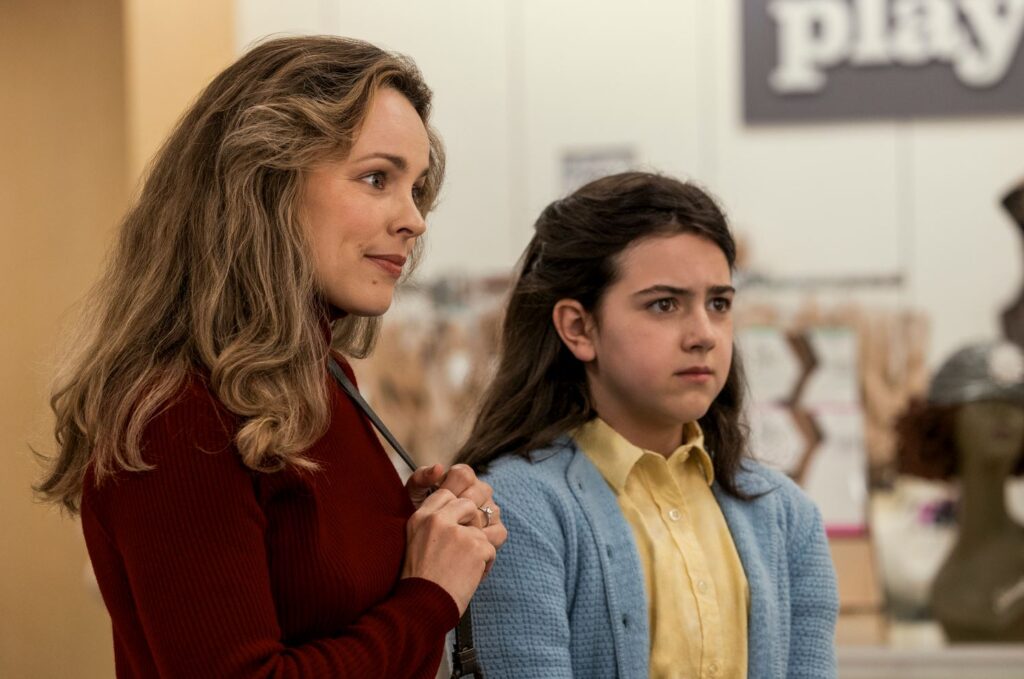
It is the nature of children to want things: a shiny new toy, an extra scoop of ice cream, a different body. Kids aren’t selfish because they’re rotten; they’re selfish because they’re kids. So as childish requests go, 11-year-old Margaret’s first prayer to the almighty—“Please don’t let New Jersey be too horrible”—is awfully modest. It’s also evidence that she’s a sweetheart, and Are You There God? It’s Me, Margaret—Kelly Fremon Craig’s nimble adaptation of the beloved Judy Blume novel—honors her decency without really complicating it. It’s a nice movie about a nice girl with nice parents, which means that, depending on your perspective, it might feel like either a memoir or a fantasy.
As a boy who grew up in the ’90s—my own pleas to an unspecified deity tended to revolve around the Super Nintendo—I can’t pretend to fully relate to the challenges of a prepubescent girl in the ’70s, but I can still appreciate the skill and care with which Fremon Craig has translated Blume’s book to the screen. Yet because my own youthful immaturity never subsided as I ventured into adulthood, I can also grumble that, while the film smoothly sketches the genre’s most durable tropes—the awkward parties, the confusing crushes, the desperate attempts to fit in—it doesn’t always flesh out its characters. It’s an enjoyable time capsule of childhood helplessness that strangely lets its adult viewers off a little easy.
I am not suggesting that Fremon Craig should have subjected her young heroine to further humiliation; she suffers plenty. (Did I mention that she was uprooted from New York City to New Jersey?) Mostly upbeat and consistently soothing, the movie adopts a tragicomic view of Margaret’s difficulties, which in a different light could be seen as a crucible of physical and psychological horrors. She worries that she’ll never develop sufficiently sized breasts. She fumbles chances to chat with a cute boy. She frets about making friends. And she regards the encroaching prospect of her period with a combination of excitement and terror—the latter only heightened when she and her fellow female sixth-graders are forced to watch an educational video (“We’re here today to talk about your changing bodies”) that seems to have been produced in the 19th century. (The shot of a male teacher discreetly fleeing that presentation is one of many examples of Fremon Craig’s lightning-quick wit.)
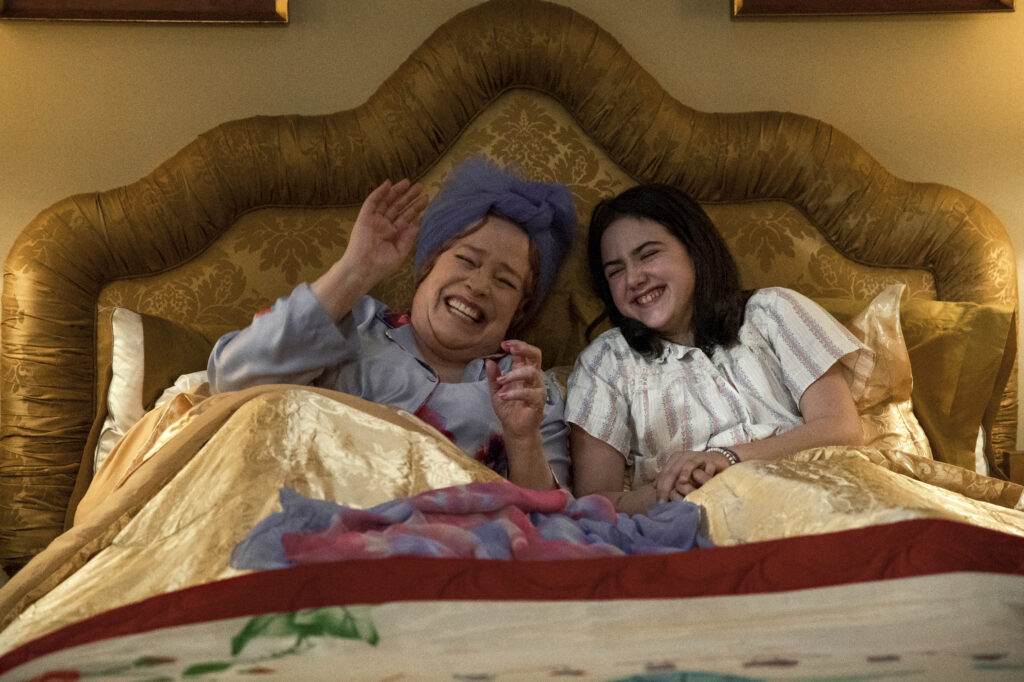
Margaret, who is persuasively played by Abby Ryder Fortson (from the first two Ant-Man flicks, and aged 14 at the time of filming, but never mind), is our reactive witness to these painful touchstones, and her recognizable angst is complemented by a whiff of genericness. The best coming-of-age pictures—recent sterling examples include Eighth Grade, Lady Bird, and Craig’s own Edge of Seventeen—splice their universality with shards of raw, personal detail. Are You There God is wonderfully compassionate and insightful, but it lacks those movies’ sense of risk and specificity. We sympathize with Margaret because we see ourselves in her—when an empty soda bottle started spinning amid a circle of sweaty grade-schoolers, I nearly dove under my seat—but at times she seems too normal, too convincing an avatar of white middle-class wholesomeness, to be interesting.
The putative exception derives from the title, as the film’s loose-limbed plot involves Margaret’s curious explorations of organized religion. Her father, Herb (Benny Safdie), is Jewish, while her mother, Barbara (Rachel McAdams), was raised by devout Christians; the rift that their marriage created with Barbara’s parents inspired them not to foist a particular creed upon their daughter, instead leaving her to choose her own belief system. For Margaret, this ostensible freedom feels an awful lot like alienation; she envies her peers’ sense of belonging, and she repeatedly poses the titular question with both sincerity and frustration.
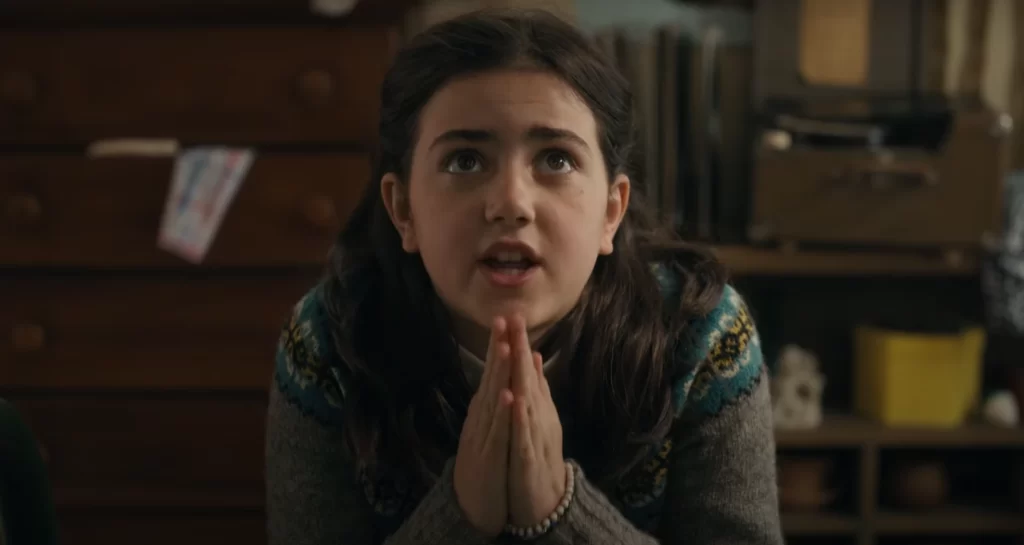
Margaret’s yearlong survey of various faiths is conceptually intriguing, but it doesn’t have much meat. The issue isn’t the limited breadth of dogmas on display; that she seems to only have two available options is presumably an accurate reflection of the movie’s time and place. It’s more that the screenplay treads too tentatively. Are You There God is somehow both pious and agnostic; it acknowledges the potentially ruinous consequences of religious zealotry—a late sequence featuring a collision of true believers, including Herb’s acid mother (a reliably funny Kathy Bates), makes the hyphen in “Judeo-Christian” look like a chasm—yet it studiously refuses to adopt a theological point of view. Believe whatever you want, it insists, and you’ll turn out fine.
Which, to be fair, isn’t the worst advice in the world. And if Are You There God’s recreation of post-counterculture feminine awakening is less than miraculous, it is certainly thoughtful and credible. The (ahem) period details are immaculate without calling attention to themselves—Fremon Craig appears to have stolen my parents’ old extendable dining-room table and plopped it into Margaret’s house—while the dialogue manages to be both snappy and authentic.
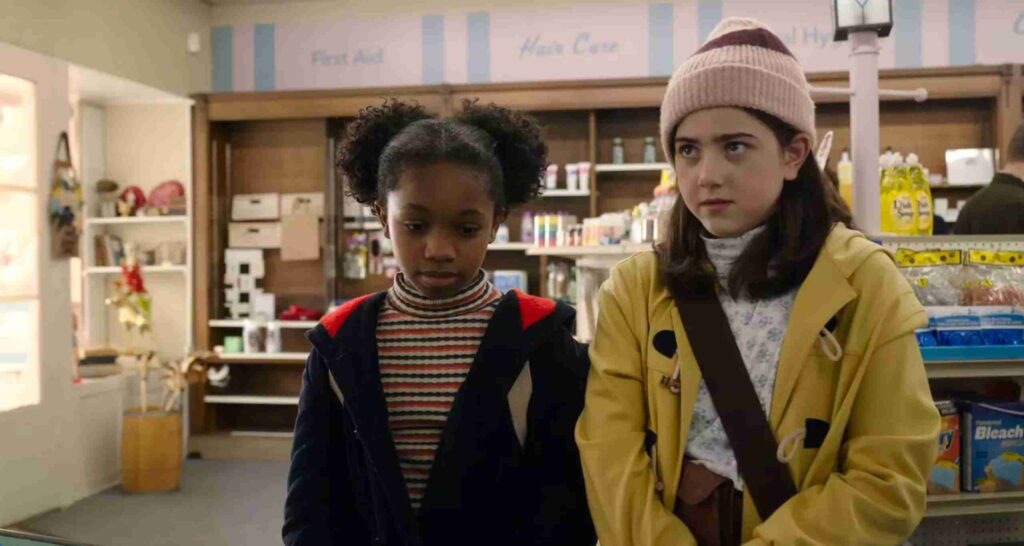
In addition to chronicling Margaret’s mortifying misadventures—the scene in which she and a friend attempt to purchase “sanitary napkins” is an instant classic of preteen agony—the story makes room for a parallel track focused on Barbara, who faces her own problems of acclimation. A former art teacher who has resigned herself to suburban housewifery, Barbara’s hurdles are not exactly towering—she waffles on which type of sofa to buy; she overstretches herself with school committees in an effort to impress the PTA—but her anxiety mirrors that of her daughter, lending further pathos to the scenes of bonding between them. The moment in which she attempts to paint a black-and-orange bird perching on a nearby branch—a fleeting opportunity to reclaim her lost sense of independence—crystallizes her lingering disenchantment, which jostles alongside her maternal tenderness.
That is an unfamiliar note to play for McAdams, who vaulted to stardom nearly two decades ago with Mean Girls, and whose bratty Regina George is a cinematic cousin to Are You There God’s most memorable character. That would be Nancy (Elle Graham), Margaret’s classmate who swiftly welcomes her to town with a mixture of friendliness, wariness, and supremacy. Remember that pint-sized murderess from the Orphan movies? Even she might quail in the shadow of Nancy, who casually informs Margaret that she’s “really flat,” and who introduces herself to Barbara with the chilling line, “I’m from the bigger house down the street.”
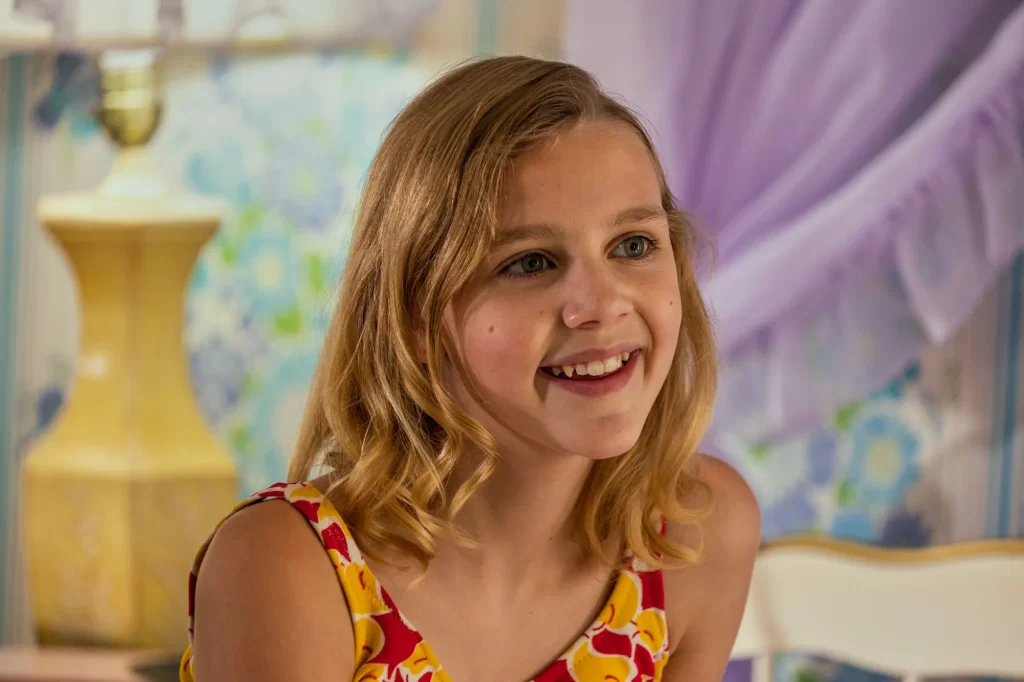
Not having read Blume’s novel, I suspect it’s unlikely the author would describe any of its young residents in villainous terms, but I’m nevertheless compelled to view Nancy as an utter sociopath. She isn’t outwardly cruel; to the contrary, she invites Margaret to be the fourth member of her club, which she governs with fascistic rigidity. She imposes a dress code (socks are forbidden, bras are required), assigns homework (compile a list of boys you want to kiss), and insists on prompt divulgence of any menstrual activity. Her authority is absolute, and Margaret and her fellow subordinates (Amari Price and Katherine Kupferer) regard their commandant with both admiration and dread, though the former shades into disappointment once her duplicity is revealed.
There is a Nancy in every neighborhood, and despite Graham’s eerily realistic performance, the character here remains two-dimensional in her monstrosity. (A crucial scene in a restaurant bathroom doesn’t so much humanize her as make her more pathetic.) And yet, there is something undeniable about her conviction, whether she’s making out with a bedpost (“You need to practice”) or leading her charges in a vigorous thoracic exercise routine (accompanied by the chant, “We must increase our bust!”). So I’m forced to wonder: How did she get like this? Is she just imitating her bossy mother (Kate MacCluggage), or has she perhaps made some religious inquiries of her own?
There’s no reason we can’t find out. Hollywood is churning everything into a franchise these days, so I’m demanding a sequel; call it “Hey Again Satan! It’s Ya Girl, Nancy.” Margaret may have survived “seven minutes in Heaven,” but let’s see how she handles a chum who receives instructions from Hell.
Grade: B
Jeremy Beck is the editor-in-chief of MovieManifesto. He watches more movies and television than he probably should.
